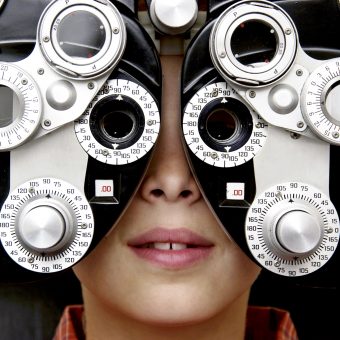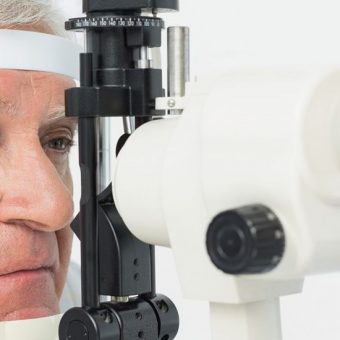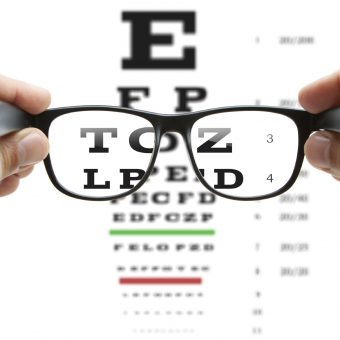One of the questions I often get is “how often should I get my eyes checked?”. My answer is usually at least every 2 years. That means – at the minimum – not 2+ years. Ideally I always promote annual eye exams for children and seniors (since they’re partially covered by MSP every year whether they have a health issue or not), but also for adults if possible. Reason being, prescriptions can still change once you’re an adult, many eye diseases are not detected by patient experiences, and the eyes are a great indicator of overall health.
 For children, annual eye exams are crucial to keep up with the growing and changing eyes. The eyes will change the most between the ages of 5-18. It is important that these changes are monitored and prescriptions changed accordingly to ensure a child’s eyes develop properly. As a child is growing, so are their eyes and it’s important that an eye doctor monitors these changes and ensures the child’s eyes are developing to keep up with the demand. The demand put on our visual system only increases as we go through school. If the visual system is not developing properly, this can hinder a child’s learning and be accidentally diagnosed with learning disorders. The first step is to make sure the child is able to see properly and use their eyes as efficiently as possible. If a child can’t see or track things properly, how can they learn at their best ability?
For children, annual eye exams are crucial to keep up with the growing and changing eyes. The eyes will change the most between the ages of 5-18. It is important that these changes are monitored and prescriptions changed accordingly to ensure a child’s eyes develop properly. As a child is growing, so are their eyes and it’s important that an eye doctor monitors these changes and ensures the child’s eyes are developing to keep up with the demand. The demand put on our visual system only increases as we go through school. If the visual system is not developing properly, this can hinder a child’s learning and be accidentally diagnosed with learning disorders. The first step is to make sure the child is able to see properly and use their eyes as efficiently as possible. If a child can’t see or track things properly, how can they learn at their best ability?
 For seniors, annual eye exams are important mainly for early disease detection. Many eye diseases that can develop with age, are not things a person can see or feel happening. It isn’t until the late stages of these diseases that a person can actually see a difference. That’s why it is crucial that seniors receive annual eye exams to catch these diseases early on to start treatment to prevent vision loss. Glaucoma and Macular Degeneration are not curable. Once a person is diagnosed, the aim is to prevent permanent vision loss that can occur if nothing is done. As cataracts develop and grow in the lens of ageing eyes, the prescription will often change as well. Annual eye exams will ensure we keep up with these changes and provide clear vision for ageing eyes until it is appropriate to have surgical removal. It is only through annual eye exams that these things can be detected and treated appropriately. At Wink Optometry, we have retinal imaging and scanning to help with early detection that can otherwise not be seen by simply looking at the retina. Technology has helped us in looking deeper into the retina to detect changes that don’t cause physiological changes that we can see with the naked eye.
For seniors, annual eye exams are important mainly for early disease detection. Many eye diseases that can develop with age, are not things a person can see or feel happening. It isn’t until the late stages of these diseases that a person can actually see a difference. That’s why it is crucial that seniors receive annual eye exams to catch these diseases early on to start treatment to prevent vision loss. Glaucoma and Macular Degeneration are not curable. Once a person is diagnosed, the aim is to prevent permanent vision loss that can occur if nothing is done. As cataracts develop and grow in the lens of ageing eyes, the prescription will often change as well. Annual eye exams will ensure we keep up with these changes and provide clear vision for ageing eyes until it is appropriate to have surgical removal. It is only through annual eye exams that these things can be detected and treated appropriately. At Wink Optometry, we have retinal imaging and scanning to help with early detection that can otherwise not be seen by simply looking at the retina. Technology has helped us in looking deeper into the retina to detect changes that don’t cause physiological changes that we can see with the naked eye.
 For adults, annual eye exams are not as crucial but still recommended depending on their health status. For healthy individuals with no predisposition to other eye diseases such as a positive family history for glaucoma or macular degeneration, and relatively low prescriptions every 2 years is fine. However, for adults that have a positive family history for eye disease or have a high prescription, it is recommended to have your eyes checked annually. People with high prescriptions are at a higher risk of developing retinal holes, tears, and detachments. It is important to screen for these at annual eye exams to ensure we treat these issues before they become larger problems or cause vision loss. Positive family histories for eye disease genetically predispose an individual to developing these diseases. Annual eye exams will help to detect these diseases at an earlier stage and prevent vision loss. Also, individuals who have diabetes, high blood pressure, high cholesterol, thyroid disease, gout, and many other common diseases, should have their eyes checked annually as well. The blood vessels in the eye are the only place a practitioner can directly view the blood vessels without being intrusive. This unobstructed view allows an eye doctor to get a good idea of what your overall health is like as well and refer for further testing if there are signs of systemic disease occurring. The eyes are a good indicator of overall health. If there is damage or bleeding seen in the back of the eyes, it is a good indicator that the rest of the blood vessels in the body are also seeing the same damage. I have also seen many adults experience prescription changes with work-life modifications – ie. increase computer work or higher demand at near.
For adults, annual eye exams are not as crucial but still recommended depending on their health status. For healthy individuals with no predisposition to other eye diseases such as a positive family history for glaucoma or macular degeneration, and relatively low prescriptions every 2 years is fine. However, for adults that have a positive family history for eye disease or have a high prescription, it is recommended to have your eyes checked annually. People with high prescriptions are at a higher risk of developing retinal holes, tears, and detachments. It is important to screen for these at annual eye exams to ensure we treat these issues before they become larger problems or cause vision loss. Positive family histories for eye disease genetically predispose an individual to developing these diseases. Annual eye exams will help to detect these diseases at an earlier stage and prevent vision loss. Also, individuals who have diabetes, high blood pressure, high cholesterol, thyroid disease, gout, and many other common diseases, should have their eyes checked annually as well. The blood vessels in the eye are the only place a practitioner can directly view the blood vessels without being intrusive. This unobstructed view allows an eye doctor to get a good idea of what your overall health is like as well and refer for further testing if there are signs of systemic disease occurring. The eyes are a good indicator of overall health. If there is damage or bleeding seen in the back of the eyes, it is a good indicator that the rest of the blood vessels in the body are also seeing the same damage. I have also seen many adults experience prescription changes with work-life modifications – ie. increase computer work or higher demand at near.
Individuals with systemic diseases are often unaware that because of their condition, they can actually lose their vision if the disease is not under control. This is why annual eye exams are highly recommended to ensure the vision is preserved and to detect/treat any changes we see in the back of the eye (retina). Vision is often a sense that we take for granted. Our goal as eye doctors is to preserve your vision to the best of our ability – but this is only possible if you come to see us. So book an exam with your eye doctor today to make sure your eyes are healthy and will see for many years to come!

